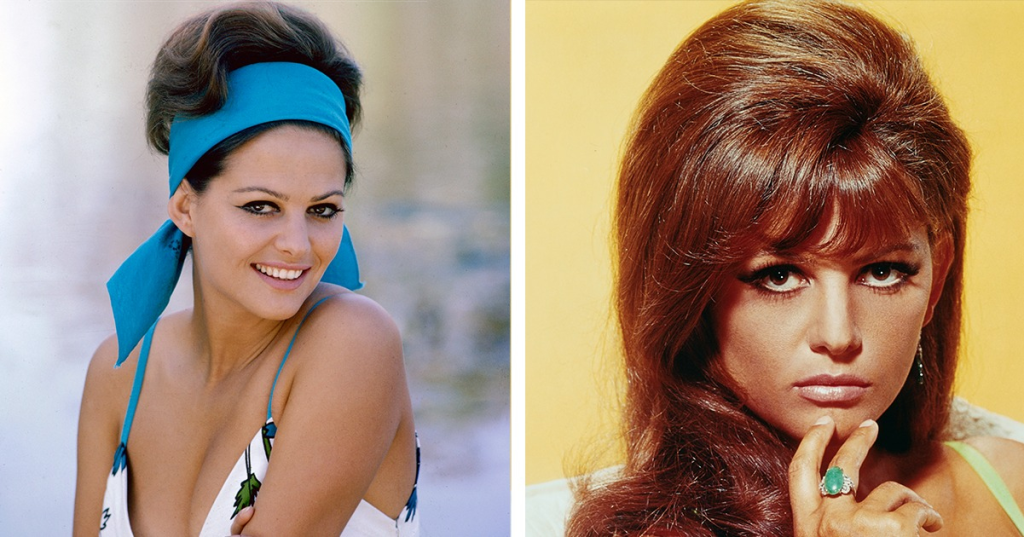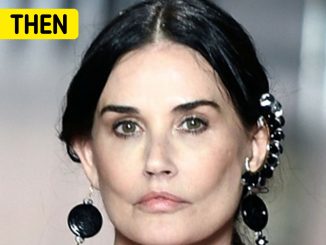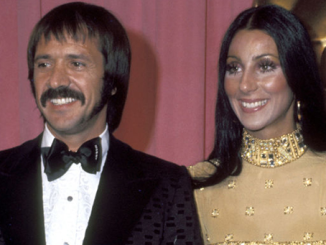
Claudia Cardinale is Italy’s counterpart to France’s Brigitte Bardot. She quickly rose to stardom to almost just as quickly disappear from the scene later on. Now, Claudia Cardinale celebrates her 85th birthday.
The Italian star was originally discovered at a beauty contest held in 1957 by the Unitalia film company. The “most beautiful Italian woman of Tunis” subsequently won a trip to the Venice Film Festival that was to become a decisive turning point in her life. The sultry young woman was born on April 15, 1938, in Tunis, the capital of Tunisia. Her mother was French, and her father Italian.
In 1958, Cardinale, known as CC, played her first role in “Goha” opposite Omar Sharif before being trained as an actress at the Italian Film Academy in Rome. Her talents as an actress renowned for her dauntless rambunctiousness gained her fame, and her gaze into the camera became legendary.
Famous director Luchino Visconti gave her minor roles in “Rocco and his Brothers” (1960), as well as in the historical drama “The Leopard” (1962) with Alain Delon. As she later recounted in a biographical interview, she rebuffed all of her famous film partners, Jean-Paul Belmondo, Marcello Mastroianni, Alain Delon and Burt Lancaster.

A beauty queen turned into a film diva
Cardinale is Italy’s counterpart of Brigitte Bardot. But in contrast to Bardot, Cardinale never appeared nude in a film: “I always thought it was more erotic to leave some room to imagination, hinting at things rather than showing everything,” she told the German magazine Stern in 2014.
CC achieved her breakthrough with her performance in the highly popular Italo western “Once Upon a Time in the West” (1969). The classical western directed by Sergio Leone and starring Henry Fonda and Charles Bronson was shot in Rome’s Cinecittà studios and in Spain with some scenes set in Utah’s Monument Valley. The film that flopped in the US only acquired cult status in Europe.

CC’s career already saw a downswing in the 1970s. She then turned to television films, especially entertainment films where she showed some talent as a comedian. She got her last main role in a movie in 1971 when she starred opposite her main rival, Brigitte Bardot, in the Italo western comedy “Frenchie King.”
Spending time in a jungle with Werner Herzog
Ten years later, CC starred in German director Werner Herzog’s historical film “Fitzcarraldo” (1981). Although Claudia Cardinale had a difficult time enduring the bouts of anger of her eccentric film partner Klaus Kinski, she greatly enjoyed shooting and working with director Werner Herzog: “Being in the middle of the jungle with insects all around me and nothing to eat was one of my most wonderful adventures,” she later stated.
Claudia Cardinale and other heroines of European film
Claudia Cardinale is seen as Italy’s counterpart to France’s Brigitte Bardot. The actress who became a star in the 1950s and 60s now celebrates her 85th birthday.
Claudia Cardinale
She’s the youngest of Italy’s three major female stars. Claudia Cardinale worked with outstanding directors like Luchino Visconti and Federico Fellini. She fascinated audiences with her charming smile and acting skills in westerns, among them “Once Upon a Time in the West” and “The Professionals” (pictured).
Gina Lollobrigida
One of the most highly acclaimed European stars of the 1950s and 60s was Gina Lollobrigida who was born in the East of Rome in 1927. “Lollo” even made it to Hollywood where she was equally showered with praise. In the 1970s, however, she withdrew from showbiz.
Sophia Loren
Another Italian actress, Sophia Loren, who was a few years younger than Lollo, became her fiercest rival. The mutual hatred and jealousy of the two stars was a frequent topic in tabloids. In contrast to Lollobrigida, Sophia Loren continued to perform in movies even as an older woman.
Brigitte Bardot
During the same time, another sexpot rose to stardom in France with movies like “And God Created Woman” and “Love is my Profession.” Brigitte Bardot, the superstar of the Grande Nation, withdrew from film production in the 1970s to devote herself to animal rights causes.
Catherine Deneuve
A decade later, Bardot’s compatriot Catherine Deneuve broke onto the film scene. Deneuve differed much from both Loren and Lollo by playing roles as aloof and myterious women early in her career. Deneueve’s talent as an actress guaranteed her success throughout her life.
Romy Schneider
The two decades between 1960 and 1980 were also the golden era of German-French actress Romy Schneider. Born in Vienna, she made her breakthrough in the German-speaking world as “Sissi” before moving to France. In Paris, she became one of the most charismatic and impressive actresses of European film scene. But in her private life, she was anything but lucky. She died in 1982.
Penélope Cruz
One of the most famous Europen actresses in recent decades is Spanish actress Penélope Cruz. Cruz started her career in her home country before achieving fame in other European countries and, finally, Hollywood. Her performances received a lot of acclaim, especially in films by director Pedro Almodóvar, among them “Volver” (pictured).
Irene Papas
After 1945, actresses from smaller European nations were able to conquer the hearts of audiences across Europe. One of them was Irene Papas who is also renowned as a singer in her home country, Greece. She celebrated her biggest success in “Zorba the Greek” (1964) before also working in other European countries, and in Hollywood.
Tatjana Samoilova
While films from Italy, France, Germany and England dominated the film scene during the postwar era, it should not be forgotten that eastern Europe had much to offer too. One of the biggest female stars of Russian film was certainly Tatjana Samoilova who achieved world fame with the movie “The Cranes are Flying” (1957).
Krystyna Janda
Polish actress Krystyna Janda became known in the 1970s for her performances in films by Polish director Andrzej Wajda. She then performed in international co-productions with stars like Lino Ventura. In her home country, Krystyna Janda is also known as a singer and an an author.
In 1993, CC received a Golden Lion for lifetime achievement at the Venice Film Festival to be followed in 2002 by an “honorary bear” at the Berlinale. The spirited actress performed in more than 100 films.
In 2017, CC once again drew attention at an international film festival. A photo depicting her as a young actress embellished a placard in Cannes where she had often been invited as an honorary guest. On April 15, Claudia Cardinale will turn 80. Happy birthday!
This article was originally published April 15, 2018 and updated.
Man in Walmart Demanded That I Give up My Wheelchair for His Tired Wife – Karma Got Him before I Could

I never expected a trip to Walmart to turn into a showdown over my wheelchair, with a stranger demanding I give it up for his tired wife. As the situation spiraled and a crowd gathered, I realized this ordinary shopping day was taking an extraordinary turn.
I was cruising down the aisles in my wheelchair, feeling pretty good after scoring some deals, when a guy—let’s call him Mr. Entitled—blocked my path.
“Hey, you,” he barked, “My wife needs to sit down. Give her your wheelchair.”
I blinked, thinking it was a joke. “Uh, sorry, what?”
“You heard me,” he snapped, gesturing to his wife. “She’s been on her feet all day. You’re young, you can walk.”
I tried to keep my cool. “I actually can’t walk. That’s why I have the chair.”
Mr. Entitled’s face turned red. “Don’t lie to me! Now get up and let my wife sit down!”
My jaw dropped. I glanced at his wife, who looked mortified.
“Look, sir,” I said, patience wearing thin, “I need this chair to get around. There are benches near the front of the store.”
But he wasn’t having it. He stepped closer, looming over me. “Listen here, you little —”
“Is there a problem here?”
I’ve never been so relieved to hear a Walmart employee’s voice. A guy named Miguel appeared, looking concerned.
Mr. Entitled whirled on Miguel. “Yes! This girl won’t give up her wheelchair for my tired wife. Make her get out of it!”
Miguel’s eyebrows shot up. “Sir, we can’t ask customers to give up mobility aids. That’s not appropriate.”
Mr. Entitled sputtered. “What’s not appropriate is this faker taking up a chair when my wife needs it!”
People were starting to stare. Miguel tried to calm things down, speaking in a low tone. “Sir, please lower your voice. We have benches available. I can show you where they are.”
But Mr. Entitled was on a roll. He jabbed a finger at Miguel’s chest. “Don’t tell me to lower my voice! I want to speak to your manager right now!”
As he ranted, he stepped back—right into a display of canned vegetables. He stumbled, arms windmilling, and went down hard.
CRASH!
Cans went flying everywhere. Mr. Entitled lay sprawled on the floor, surrounded by dented tins of green beans and corn. For a moment, everything was silent.
His wife rushed forward. “Frank! Are you okay?”
Frank tried to get up, but slipped on a rolling can and went down again with another crash.
I couldn’t hold back a laugh. Miguel shot me a look, fighting a smile too.
“Sir, please don’t move,” Miguel said, reaching for his walkie-talkie. “I’m calling for assistance.”
Frank ignored him, struggling to his feet again. “This is ridiculous! I’ll sue this whole store!”
By now, a small crowd had gathered. A security guard and a manager appeared, taking in the scene—Frank standing unsteadily, cans everywhere, Miguel trying to keep things calm.
“What’s going on here?” the manager asked.
Frank opened his mouth to rant again, but his wife cut him off. “Nothing,” she said quickly. “We were just leaving. Come on, Frank.”
She grabbed his arm and started pulling him towards the exit. As they passed me, she paused. “I’m so sorry,” she whispered.
Then they were gone, leaving a mess of cans and confused onlookers in their wake.
The manager turned to me. “Ma’am, I’m so sorry for the disturbance. Are you alright?”
I nodded, finding my voice. “Yeah, I’m fine. Just… wow. That was something else.”
He apologized again and started organizing the cleanup. People began to disperse, but a few helped pick up cans.
An older woman approached me, patting my arm. “You handled that so well, dear. Some people just don’t think before they speak.”
I smiled. “Thanks. I’m just glad it’s over.”
As the commotion died down, I decided to finish my shopping. No way was I letting Frank ruin my entire trip. I rolled down the next aisle, trying to shake off the residual tension.
“Hey,” a voice called out. I turned to see Miguel jogging up to me. “I just wanted to check if you’re really okay. That guy was way out of line.”
I sighed. “Yeah, I’m alright. Thanks for stepping in. Does this kind of thing happen often?”
Miguel shook his head. “Not like that, no. But you’d be surprised how entitled some people can be. It’s like they forget basic human decency when they walk through the doors.”
We chatted for a bit as I continued shopping. Miguel shared some of his own customer service horror stories, which honestly made me feel a bit better. At least I wasn’t alone in dealing with difficult people.
As I left the store, I couldn’t help but shake my head at the whole experience. What a day. But you know what? For every Frank out there, there are way more decent folks—like Miguel, that nice older lady, and curious kids.
I headed home, my faith in humanity a little battered but still intact. And hey, at least I had a wild story to tell. Plus, I got some free cereal out of the deal. Silver linings, right?



Leave a Reply